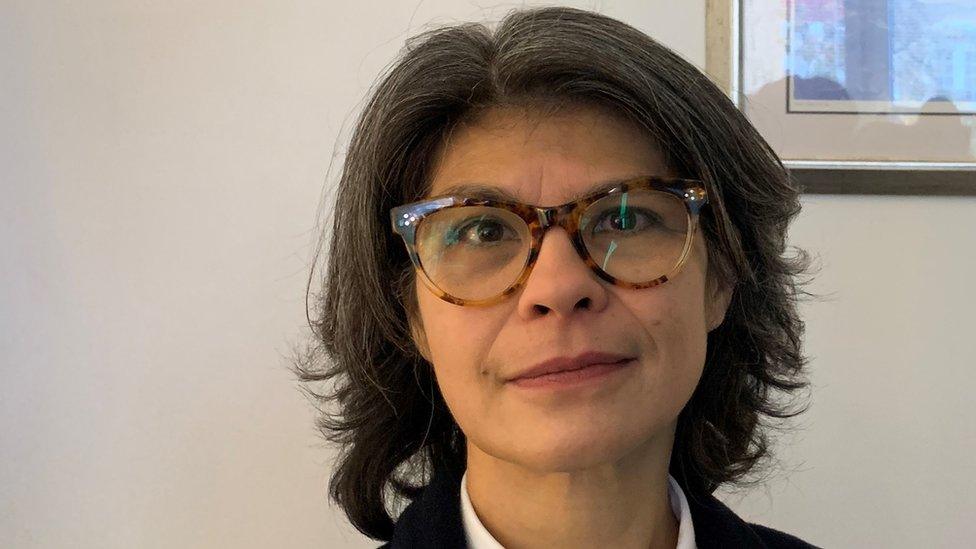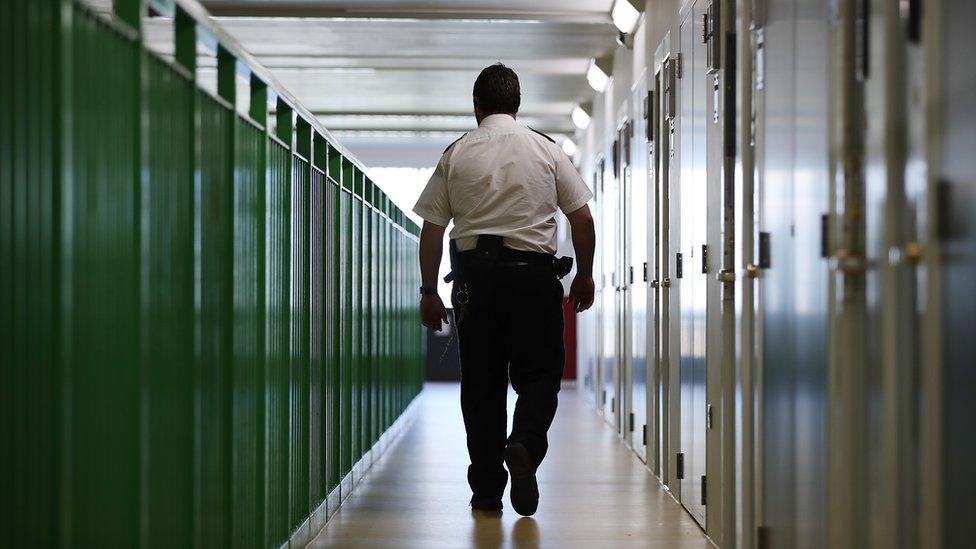Deaths in Scottish prisons at record high
- Published
Stuart Allan says the impact of the death of daughter Katie in prison has been massive
A record number of people have died in Scottish prisons in the past three years.
A report, by academics at Glasgow University, shows there have been 121 deaths since the start of 2020, with suicide and drugs deaths on the rise.
The rate of suicide and drugs deaths in Scottish jails is significantly higher than in England, the report said.
The Scottish Prison Service said it worked to give people the best possible care and wellbeing.
The new report, seen by the BBC, studied data going back to 1995.
It said the 121 people who died in prison in Scotland between the start of 2020 and September this year compared with 98 in the previous three full years.
Covid played a role in the record-breaking number of prison deaths, with 15 prisoners dying from the virus, but deaths from other medical conditions have held fairly steady while drugs fatalities and people taking their own lives have been on the rise.
There have been 29 deaths by suicide and 25 from drugs since the start of 2020, with a further eight whose cause is undetermined, which could add to the drugs toll.
The academics said deaths from suicide and drugs were typically "from distress and loss of hope", which are of particular concern when assessing prison regimes and conditions
The report said a person who was imprisoned in 2022 in Scotland would be twice as likely to die in jail as someone in 2008.

Prof Sarah Armstrong was one of the lead authors of the report
Prof Sarah Armstrong, one of the lead authors of the report, said: "We don't have a death penalty anymore in this country and yet for many people - more than 100 - going to prison is a death sentence.
"We are talking about people who are entirely dependent on the state to live.
"People in prison won't get food, won't get healthcare or shelter unless the state does its job.
"And when you have such a high rate of death in prison - and a higher suicide rate and drug death rate than in English prisons - real questions are raised about the quality of that care."
The prison service introduced its suicide prevention strategy called Talk To Me six years ago.
The academics found that there had been a 42% increase in suicides since the strategy was introduced compared with the six previous years.

'People in prison are being failed by the state'

Katie Allan died in Polmont Young Offenders Institute in 2018 and an FAI has yet to be held
Katie Allan was a third year student at Glasgow University when she was jailed for a hit and run incident. She was just 21 when she took her own life in Polmont in 2018.
Her mother Linda Allan, who is an academic and co-author of the report, said: "People in prison are being failed by the state and losing their lives in the care of the state. And very often - in our opinion - that is avoidable."
Katie's father Stuart said there had been more than 50 suicides in Scottish jails since his daughter died.
"The impact on us has been massive," he said.
"You don't go a day or a moment in the day without thinking about Katie."
Mr Allan said he lived his life battling to get a justification for why Katie died and to make sure it did not happen to other people who found themselves in the prison service.

Fatal Accident Inquiries (FAIs) are meant to ensure an effective investigation into deaths and accountability but the report said they were failing to do that.
It found that, on average, FAIs into prison deaths took more than two years to complete and almost never made any recommendations or offered points of learning for the prison service.
One inquiry published earlier this year took more than four years and made no findings beyond time, place and cause of death.
The report highlighted cases where prisoners died arguably preventable deaths, including one man who died from psoriasis after waiting months for medical treatment.
It also highlighted inmates who took their own lives after not being placed on suicide watch despite a history of self-harm.
The report said: "One year has passed since we reported that deaths have been rising in Scottish prisons, and that FAIs to investigate these take a significant amount of time only to determine no changes are needed.
"Since then, deaths have continued to rise, accelerating during the pandemic for reasons beyond Covid, and FAIs are continuing to take years with the same low rate of determining nothing could be done, or can be done."
The Scottish government-commissioned Independent Review of the Response to Deaths in Custody, published 12 months ago, emphasised "the human rights obligation of the state to carry out an effective investigation into death and ensure accountability where state responsibility arises".
Emotional distress
The Scottish government accepted the recommendation and set up a deaths in custody action group - but since then the rate of deaths has increased.
A Scottish Prison Service spokesman said: "We recognise the profound emotional distress experienced by families when a loved one dies in custody."
He said the prison service wanted people to have the best possible health and wellbeing and was working closely with the NHS and charities on suicide prevention.
Earlier this year, the prison service said the most common way to smuggle psychoactive substances into jails was by spraying them on to pieces of paper posted to prisoners.
The SPS spokesman said preventative measures such as photocopying mail had led to a significant fall in illicit substance misuse.
He also said that there are increasing numbers of older people in prison, with the same health and care challenges as the wider community.
A Scottish government spokesperson said: "The safe treatment and mental health of all those in custody is a key priority for Scotland's prisons, which care for people with higher levels of risk and vulnerability than the general population as a whole.
"The Crown Office has significantly reformed its processes to reduce the time taken to investigate deaths and to bring FAIs to court more quickly. It is for the presiding sheriff, who has heard all the evidence, to determine what recommendations, if any, should be made."
- Published27 October 2022

- Published12 January 2022

- Published15 September 2021
